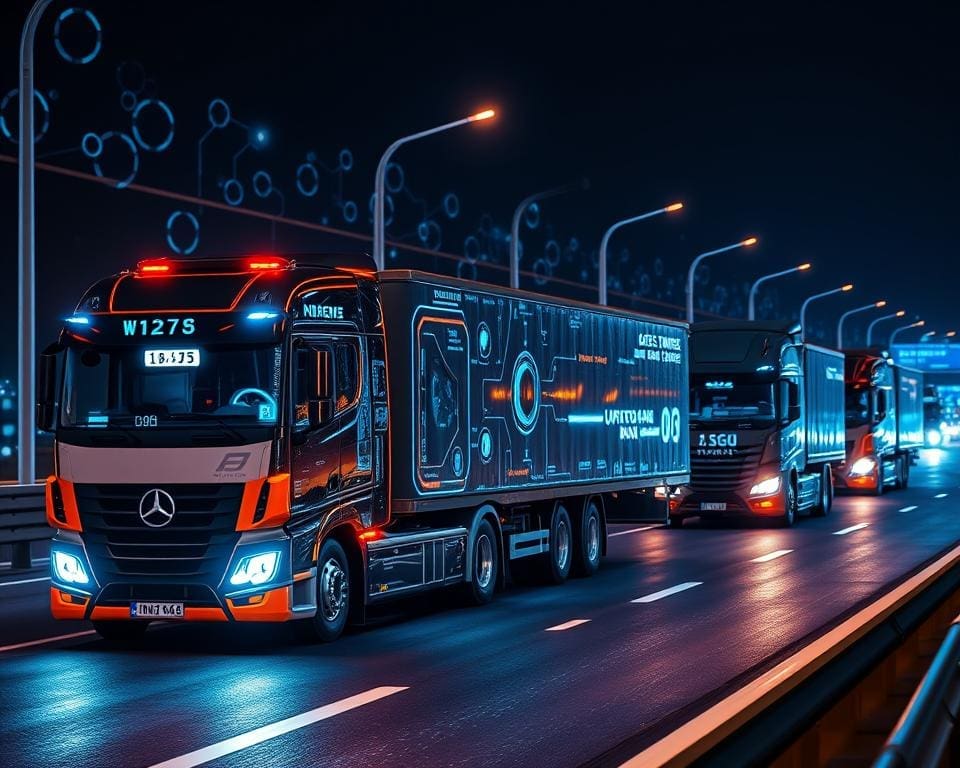In an era where technology is redefining the logistics landscape, Smart Trucks equipped with the Internet of Things (IoT) are at the forefront of enhancing long-haul transport safety. This transformative technology not only streamlines operations but also significantly reduces the risk of accidents on our roads. Given that approximately 70% of all freight in the United Kingdom relies on the long-haul trucking sector, the need for innovation in this critical area has never been more pronounced.
The integration of IoT into Smart Trucks facilitates a deeper understanding of vehicle performance and road conditions, paving the way for safer, more efficient transport practices. As we delve into the advancements and future potential of this technology, it becomes evident that fostering safety in long-haul transport cannot be overlooked. Together, we unlock the future of logistics, where technology and safety go hand in hand.
The Rise of Smart Trucks in Road Transport
The transformation in road transport is heavily influenced by the onset of Smart Trucks. These vehicles represent a significant leap in Truck Technology, enhancing operational efficiency and safety. Advanced features powered by IoT have turned everyday trucks into smart, interconnected vehicles that offer numerous benefits for the logistics industry.
Understanding Smart Truck Technology
Smart Truck Technology integrates a variety of components such as sensors, GPS, and telematics. This intricate blend enables vehicles to collect and transmit vast amounts of data in real-time. Fleet operators can monitor vehicle performance and location precisely, leading to remarkably improved efficiency. As Smart Trucks evolve, they offer unmatched insights into transport operations, ultimately shaping the future of logistics.
The Role of IoT in Trucking
IoT plays a pivotal role in the lifecycle of Smart Trucks, ensuring seamless Vehicle Connectivity. This technology facilitates real-time communication between trucks, fleet operators, and logistics companies, creating a robust network of information flow. Enhanced connectivity promotes better decision-making processes, optimising supply chains and reducing operational costs. Ultimately, IoT enhances productivity and effectiveness, allowing the transport sector to flourish in an ever-demanding marketplace.

Smart Trucks: IoT Enhances Long-Haul Transport Safety
The integration of Smart Trucks into the logistics sector represents a significant advancement in maintaining Transport Safety during long-haul journeys. By leveraging IoT technologies, these vehicles are equipped to monitor critical parameters and provide essential information in real-time.
Real-time Data for Safer Journeys
Real-time Data collection plays a crucial role in ensuring safer journeys for drivers and cargo. Smart Trucks continuously track various metrics such as speed, fuel consumption, and driver behaviour, allowing for instantaneous feedback to enhance compliance with safety regulations. This data-driven approach enables fleet managers to swiftly identify and address potential issues, thus minimising the risk of accidents.
Preventative Measures and Risk Mitigation
The proactive nature of Smart Trucks enhances Risk Mitigation strategies. Technologies such as collision avoidance systems and fatigue monitoring contribute to a more secure driving experience. With advanced vehicle diagnostics integrated with IoT, fleet operators can predict and manage mechanical failures before they escalate, ensuring that every journey is as safe as possible.
Fleet Management Innovations through IoT
The integration of IoT in fleet management is revolutionising the way businesses optimise their operations. Smart technology allows managers to analyse traffic patterns and weather conditions effectively, enabling strategic route optimisation. This results in significant improvements in overall efficiency.
Optimising Routes for Efficiency
Route optimisation powered by smart technology plays a crucial role in streamlining fleet management. By utilising real-time data, fleet managers can adjust routes dynamically to avoid traffic and minimise fuel consumption. This not only enhances safety but also contributes to reduced delivery times. Key benefits include:
- Low operational costs through reduced fuel usage.
- Improved customer satisfaction with timely deliveries.
- Lower carbon footprint, aligning operations with sustainability objectives.
Managing Fleet Operations with Smart Technology
Efficient fleet management is greatly improved by leveraging smart technology for monitoring operations. Cloud-based management platforms facilitate seamless communication among drivers and fleet managers, enabling constant oversight and quick responsiveness. The advantages of using these platforms are evident:
- Enhanced tracking of vehicle performance.
- Timely maintenance alerts to prevent breakdowns.
- Data-driven insights for making informed decisions.
Improving Driver Monitoring and Safety
In the modern world of transport, effective Driver Monitoring systems play a pivotal role in ensuring Safety on the roads. With the advancements in technology, there is a growing emphasis on utilising integrated Alerts to keep drivers informed and responsive to potential hazards. The use of real-time data allows drivers to receive immediate notifications about their actions, such as speeding or erratic driving behaviour, enabling them to make necessary adjustments on the fly.
The Importance of Driver Alerts
Driver Alerts serve as essential tools for enhancing safety. These notifications not only warn drivers of unsafe practices but also promote a culture of responsibility on the road. When drivers are alerted to their actions in real-time, they develop a heightened awareness of their driving habits. This proactive approach significantly reduces the likelihood of accidents and contributes to safer journeys for everyone.
Training and Support Systems for Drivers
In addition to Alerts, comprehensive training and Support Systems for drivers are crucial. Many fleet companies are investing in IoT-powered simulations that prepare drivers for various conditions. These training modules focus on developing safe driving habits and providing drivers with the knowledge they need to navigate complex situations. Such initiatives, backed by the latest technology, not only improve driver performance but also enhance the overall safety of the transportation network.
Future Trends in Smart Transportation
The landscape of smart transportation is on the verge of a remarkable transformation, driven primarily by the Future Trends in IoT and Vehicle Connectivity. As technologies continue to develop, we can anticipate the emergence of fully autonomous vehicles that not only transport freight but also optimise routes and reduce operational costs. These innovations promise to enhance efficiency while ensuring that safety remains paramount on the roads.
Furthermore, the integration of advanced artificial intelligence will play a crucial role in analysing vast amounts of data collected from vehicles. This analysis will lead to predictive maintenance, allowing for timely interventions and minimising downtime. With Smart Transportation evolving, businesses will be able to harness these insights to make informed decisions, ensuring seamless operations in a competitive market.
Looking ahead, the application of blockchain technology for secure logistics and smart contracts will increase transparency across the supply chain. As the industry embraces these cutting-edge developments, smart trucks are set to incorporate advanced safety features as standard, establishing new benchmarks and ensuring a safer future for all road users. The journey toward a more connected and efficient transport system is not just a vision; it is rapidly becoming reality.









